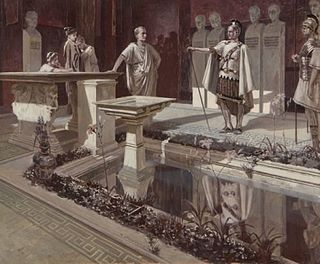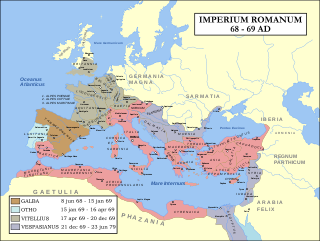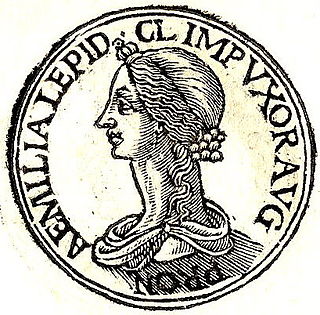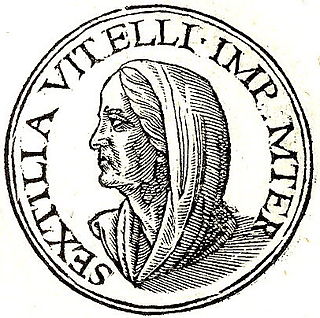Related Research Articles

Julia Agrippina, also referred to as Agrippina the Younger, was a Roman empress.

Domitian was Roman emperor from 81 to 96. He was the son of Vespasian and the younger brother of Titus, his two predecessors on the throne, and the last member of the Flavian dynasty. During his reign, the authoritarian nature of his rule put him at sharp odds with the Senate, whose powers he drastically curtailed.

The Julio-Claudian dynasty comprised the first five Roman emperors: Augustus, Tiberius, Caligula, Claudius, and Nero.

Aulus Vitellius was Roman emperor for eight months, from 19 April to 20 December AD 69. Vitellius was proclaimed emperor following the quick succession of the previous emperors Galba and Otho, in a year of civil war known as the Year of the Four Emperors. Vitellius was the first to add the honorific cognomen Germanicus to his name instead of Caesar upon his accession. Like his direct predecessor, Otho, Vitellius attempted to rally public support to his cause by honoring and imitating Nero who remained widely popular in the empire.

Tiberius Claudius Caesar Britannicus, usually called Britannicus, was the son of Roman emperor Claudius and his third wife Valeria Messalina. For a time he was considered his father's heir, but that changed after his mother's downfall in 48, when it was revealed she had engaged in a bigamous marriage without Claudius' knowledge. The next year, his father married Agrippina the Younger, Claudius' fourth and final marriage. Their marriage was followed by the adoption of Agrippina's son, Lucius Domitius, whose name became Nero as a result. His step-brother would later be married to Britannicus' sister Octavia, and soon eclipsed him as Claudius' heir. Following his father's death in October 54, Nero became emperor. The sudden death of Britannicus shortly before his fourteenth birthday is reported by all extant sources as being the result of poisoning on Nero's orders—as Claudius' natural son, he represented a threat to Nero's claim to the throne.

Aulus Plautius was a Roman politician and general of the mid-1st century. He began the Roman conquest of Britain in 43, and became the first governor of the new province, serving from 43 to 46.

The Year of the Four Emperors, AD 69, was a period of the Roman Empire in which four emperors ruled in succession: Galba, Otho, Vitellius, and Vespasian. It is considered an important interval, highlighting the turmoil of the state of Rome following the reign and suicide of the emperor Nero.

The Flavian dynasty ruled the Roman Empire between AD 69 and 96, encompassing the reigns of Vespasian (69–79), and his two sons Titus (79–81) and Domitian (81–96). The Flavians rose to power during the civil war of 69, known as the Year of the Four Emperors. After Galba and Otho died in quick succession, Vitellius became emperor in mid 69. His claim to the throne was quickly challenged by legions stationed in the Eastern provinces, who declared their commander Vespasian emperor in his place. The Second Battle of Bedriacum tilted the balance decisively in favour of the Flavian forces, who entered Rome on December 20. The following day, the Roman Senate officially declared Vespasian emperor of the Roman Empire, thus commencing the Flavian dynasty. Although the dynasty proved to be short-lived, several significant historic, economic and military events took place during their reign.
Two noblemen, an uncle and nephew, who shared the name Lucius Junius Silanus Torquatus and were descendants of the Roman Emperor Augustus, lived during the 1st century AD.
Junia Calvina was a Roman noblewoman who lived in the 1st century AD. The daughter of Aemilia Lepida and Marcus Junius Silanus Torquatus, consul in 19, Calvina belonged to two patrician houses: the gens Aemilia and gens Junia respectively. She was also the great-great-granddaughter of the Roman emperor Caesar Augustus on her mother's side of the Imperial family. As such, she was also related by blood to the gens Julia, the aristocratic family of the Roman dictator Julius Caesar. Tacitus calls Calvina "festivissima puella" and the Emperor Vespasian, in one of his jokes, mentions her as living in AD 79. Seneca describes her as "most celebrated of all women ."

The gens Junia was one of the most celebrated families of ancient Rome. The gens may originally have been patrician, and was already prominent in the last days of the Roman monarchy. Lucius Junius Brutus was the nephew of Lucius Tarquinius Superbus, the seventh and last King of Rome, and on the expulsion of Tarquin in 509 BC, he became one of the first consuls of the Roman Republic.

De vita Caesarum, commonly known as The Twelve Caesars, is a set of twelve biographies of Julius Caesar and the first 11 emperors of the Roman Empire written by Gaius Suetonius Tranquillus.
Titus Flavius T. f. T. n. Sabinus was a Roman politician and soldier. A native of Reate, he was the elder son of Titus Flavius Sabinus and Vespasia Polla, and brother of the Emperor Vespasian.

Aemilia Lepida was a noble Roman woman and matron. She was the first great-grandchild of the Emperor Augustus.

Sextilia was the mother of Lucius Vitellius the Younger and Aulus Vitellius.
The gens Vitellia was a family of ancient Rome, which rose from obscurity in imperial times, and briefly held the Empire itself in AD 69. The first of this gens to obtain the consulship was Aulus Vitellius, uncle of the emperor Vitellius, in AD 32.
Lucius Junius Quintus Vibius Crispus was a Roman senator and amicus or companion of the Emperors, known for his wit. He was a three-time suffect consul.

The gens Antonia was a Roman family of great antiquity, with both patrician and plebeian branches. The first of the gens to achieve prominence was Titus Antonius Merenda, one of the second group of Decemviri called, in 450 BC, to help draft what became the Law of the Twelve Tables. The most prominent member of the gens was Marcus Antonius.
Marcus Junius M. f. M. n. Silanus Torquatus was a Roman senator. He was consul in AD 19, with Lucius Norbanus Balbus as his colleague.
References
- ↑ Paul Gallivan, "The Fasti for the Reign of Claudius", Classical Quarterly , 28 (1978), pp. 409, 425
- 1 2 Shotter, David (2008). Nero Caesar Augustus: Emperor of Rome. Oxon: Routledge. p. 50. ISBN 9781405824576.
- ↑ Steven Rutledge, Imperial Inquisitions: Prosecutors and informants from Tiberius to Domitian (London: Routledge, 2001), pp. 299f
- ↑ Suetonius, "Vitellius", 5
- ↑ Rutledge, Imperial Inquisitions, p. 298
- ↑ Suetonius, "Vitellius", 13.2
- ↑ Tacitus, Histories III.38-9
- ↑ Tacitus, Histories, III.76f; IV.2